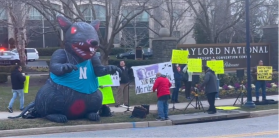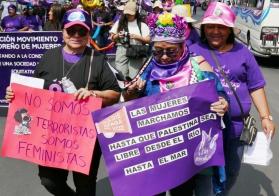Press release: US citizens demand that US stop promoting militarization in Central America
PRESS RELEASE
US citizens present petition signatures to US Embassy in San Salvador, demand an end to US promotion of militarization in Central America
Contact: Alexis Stoumbelis in Washington, DC (202) 521-2510 ext. 205 March 15, 2012 San Salvador, El Salvador A group of US citizens visiting El Salvador presented the following statement to the Salvadoran press today following a meeting with representatives of the US Embassy in San Salvador. During the meeting, they delivered petition signatures demanding an end to the coercive use of economic and security aid in El Salvador and that US resources be directed to the long-term solutions promoted by the Salvadoran social movement, including violence prevention and economic security, rather than to increasing levels of repressive militarization. “We have watched with increasing concern the recent trend of US pressure for the re-militarization of Central America. We know the disgraceful history of United States with respect to the funding, training and so-called advisors that served brutal military dictatorships during in the region, especially under the Reagan administration. In fact, this support by the US government was the reason why CISPES – the Committee in Solidarity with the People of El Salvador - was founded 30 years ago to stop the $1 million dollars a day that came from US to fund the kidnappings, massacres and human rights abuses perpetrated by the repressive state forces of the Salvadoran government and the state-linked death squads. We believe today just as we believed in the 1980s that US money and political pressure to direct the activities of El Salvador's security structures and institutions are a clear violation of the autonomy and self-determination of the government and people of El Salvador. Recently, there have been major changes in the security cabinet that have resulted in high-ranking positions previously held by FMLN appointees being replaced by individuals willing to cooperate with new US security initiatives. According to anonymous sources in the Ministry of Public Security, the removal of ex-Minister Manuel Melgar was a condition for the US to sign the Partnership for Growth with El Salvador. Melgar was replaced by General David Munguía Payés, who is a graduate of the notorious US military training facility, the School of the Americas. Former National Civil Police Director Carlos Ascencio was also removed and replaced by a general who was also trained at the School of the Americas. This alleged pressure by the US to remove Melgar and other security officials represents a clear interference in the sovereignty of the Funes government in order to promote the US agenda of militarization. The Partnership for Growth, supposedly an economic development program, has done little more than outline repressive security policies for El Salvador. Furthermore, we understand that any US pressure for military involvement in the public security results in a violation of the country's Constitution and the 1992 Peace Accords, which established civilian control over the Salvadoran police force. Salvadoran society, which we recognize has suffered countless atrocities committed by the military and other state forces during the Civil War, will once again see an influx of arms and growth of military and police forces, paid for by the US’ own regional anti-drug and anti-gang initiative called CARSI, the Central American Regional Security Initiative. The US has itself pledged $300 million dollars for this new initiative. CARSI includes the US-funded International Law Enforcement Academy (ILEA) in Santa Tecla, El Salvador, which has been training Salvadoran and Latin American police since 2006 using curriculum and trainers that the US refuses to disclose. In our view, the US is pouring millions of dollars into militaristic programs that do not address the very real security problem in El Salvador at its root, which is the economic inequality and social exclusion that forces people to turn to crime and gangs for a way to live. According to the US, the CARSI and the ILEA both are designed to fight narco-trafficking in Central America. However, the reality is that the current model of US policies to stem the flow of drug from Latin America to the United States, for example, Plan Colombia and the Mérida Initiative in Mexico, have been overwhelmingly ineffective at removing illegal drugs from US markets, despite ever-increasing financial, military and logistical resources for these initiatives. The effect of militarization in Latin America has created a climate of increased violence and unprecedented numbers of civilian casualties. In Mexico, over 40,000 innocent lives have been lost in the US funded “War on Drugs.” Proclaimed anti-narco policy successes, such as Plan Columbia, have only succeeded in pushing the production and trafficking of drugs to other countries. Attempts to battle organized crime through militaristic actions such as “Operation Wide Receiver” and “Operation Fast and Furious” have had the sole effect of increasing violence in the communities in which the operations have taken place. As long as the largest market for illegal drugs in the world exists in the United States and drugs remain illegal in the US, all efforts to combat drug traffickers through militaristic strategies in the Americas will fail. We are also skeptical that the purpose of these initiatives is truly to fight drugs, gangs and organized crime. How else can the US government explain the following situation? When former Minister of Public Security Manuel Melgar requested that the US Drug Enforcement Agency (DEA) release its list of suspected traffickers, generated from bank statements tracking the movement of enormous sums of money, the DEA refused to share that information. If the US is so concerned about prosecuting drug lords and cartels in El Salvador, why won't they share the basic information that can help the Salvadoran government capture and prosecute these alleged criminals? We can only conclude that US counter-drug and counter-gang policies in Latin America correspond to a hidden agenda, outside of their publicly stated objectives. As we see it, these policies have been quite effective in creating cycles of violence and destabilization that have been used to justify further militarization that benefits the US government, transnational corporations and local elite interests. Over the past decade, US power in Latin America and specifically Central America—an area of strategic importance—has been waning. Under the guise of fighting the “War on Drugs” the US has built new military bases, authored policies, and established a stronger presence throughout the region in an attempt to reassert US hegemony and secure access to critical natural resources and markets. In the context of global economic crisis, corporations desperate to expand their profits are also major stakeholders in the remilitarization process. The private security industry is booming, with US defense contractors - not the governments of Mexico or Central America - receiving 80% of the millions of dollars in US security aid to produce weapons, supplies and training for the War on Drugs. US drug war policy is also building the infrastructure to repress the social and political movements demanding systematic change. As the economic crisis deepens, more and more people have been pushed into poverty around the world, and they’re fighting back. But instead of waging a war on poverty, the US war on drugs paves the way for the use of force to maintain and advance the very neoliberal policies that cause such widespread unrest. Indeed, former Secretary of State Condoleezza Rice publicly stated that purpose of the ILEA was make Latin America “safe for foreign investment” and free trade. In the wake of successful grassroots mobilizations that defeated attempts to privatize healthcare in El Salvador, the US State Department was instrumental in drafting an anti-terrorism law for El Salvador that criminalizes civil disobedience as terrorism, based on the USA Patriot Act. The Central American right-wing has also been able to capitalize on security problems for their own political gain. For months leading up to last Sunday’s municipal and legislative elections in El Salvador, the right wing-owned media bombarded the public with sensationalized images of murder and violence, preying on people’s fears and criticizing the FMLN for failing to address these problems. Meanwhile, ARENA campaigned on “iron fist” security policies aligned with the US drug war agenda and won the elections. Genocidal general Otto Perez-Molina recently won the presidency in Guatemala on this same platform, indicating the regional nature of this strategy, which has spilled over from Mexico as well. Based on the failures and the unforgivable death tolls caused by “iron-fist,” militaristic policies written, advocated and funded by the US, we call on the US government to fund alternative policies that have been proposed by the FMLN, Salvadoran social movement organizations and other sectors of civil society. Organizations like FESPAD, the Foundation for the Study and Application of the Law, have proposed comprehensive plans that would move El Salvador towards greater social and economic security through programs of violence prevention and rehabilitation for adults and youth. Crime cannot be addressed adequately without resolving the underlying social and economic issues, and without including constructive, alternative options for youth. Since his first months in office, President Funes has called on the US to help El Salvador move forward by addressing the country's precarious economic situation as a way to fight violence and insecurity for his compatriots. Furthermore, as US citizens we recognize that the justification for the US “War on Drugs” is based on our own country's enormous demand for illegal drugs. More and more Latin American dignitaries are pointing out that no amount of anti-narco programs will successfully cut the flow of drugs through the Americas as long as the demand for drugs exists within the US. Given the facts regarding US anti-drug and anti-crime policies, we demand that the United States direct its immense energies towards economic and social programs that the social movement, FMLN and civil society considers to be the highest priorities for El Salvador. The government and people of El Salvador are the only ones that have the right to make decisions regarding their country. The US, as a country that claims to stand for democracy, should respect the right of El Salvador to make decisions without the coercion and bullying that has characterized US diplomacy towards El Salvador. Today we met with the US Embassy and presented a petition signed by hundreds of concerned US citizens with the following demands:
- That the US stop using security and economic cooperation, such as the Partnership for Growth, to influence the internal decisions of the Salvadoran government.
- That the US stop the re-militarization of El Salvador and the region in order to fight the “War on Drugs” and focus on prevention and treatment both in the US and Central America
We also recognize that the US has used more than just military means in their attempts to control El Salvador. In the past our government has resorted to economic and political forms of intervention as well. Recognizing this reality, today we also demanded that the US government not interfere in any way in the 2014 presidential elections and furthermore issue a neutrality statement in advance of these crucial elections, declaring its willingness to cooperate equally with any candidate who wins the presidency.” ###

 "I am a CISPES supporter because continuing to fight for social justice and a more people-centered country means continuing the dream and sacrifice of thousands of my fellow Salvadorans who died for that vision.” - Padre Carlos, New York City
"I am a CISPES supporter because continuing to fight for social justice and a more people-centered country means continuing the dream and sacrifice of thousands of my fellow Salvadorans who died for that vision.” - Padre Carlos, New York City

